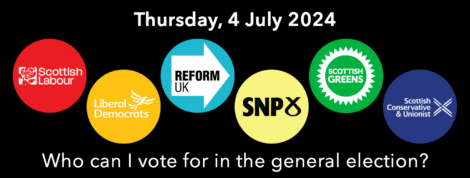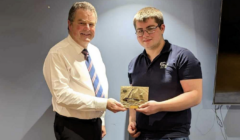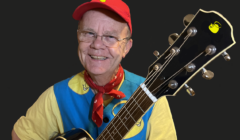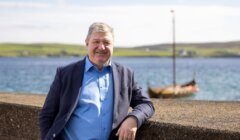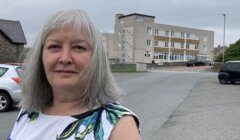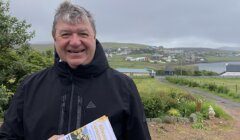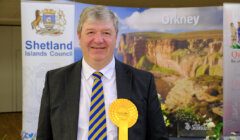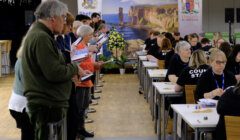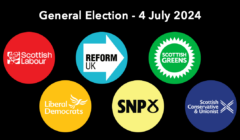Election / Brae pupils challenge election candidates on host of topics
THE IDEA of a national service proposed by the Tories, the cost of living crisis, Scottish independence and whether Shetland needs any more wind turbines were the hotly debated topics at the Brae High School election hustings on Tuesday afternoon.
Held since 2003 to encourage pupils to become active and well-informed citizens, around 80 young people – all of them not at voting age yet – were engaged in a good discussion that covered a lot of ground.
It got off to a rousing start when the Tories’ flagship policy of a mandatory national service was unanimously voted down in a show of hands with not one pupil in the room being in favour of it.
Tory candidate Shane Painter sought to justify the policy by pointing out that those who did not like the idea of a year-long mandatory military service could opt to volunteer in a civic role, but all the other candidates present agreed: it was a gimmick and just not credible.
Next question up was how to tackle the cost of living crisis which despite falling inflation rates is far from over.
Candidates focused on their various policies to reduce the burden of high energy prices with Labour’s Conor Savage advocating the party’s commitment to form a publicly owned energy company and, in its wake, creating 50,000 green jobs by 2030.
Become a member of Shetland News
SNP hopeful Robert Leslie said the Scottish Government with its limited powers has been trying to mitigate against the squeeze on public services coming from the Westminster government but, ultimately, energy needed to be put back to public control.
Green candidate Alex Armitage spoke on his party’s policies of redistributing some of the country’s wealth by introducing a ‘Robin Hood’ tax – “without being violent” – as well as a universal basic income for everybody.
Alistair Carmichael, Lib Dem candidate and the isles’ MP for the last 21 years, remarked that introducing a wealth tax might not be as easy as it sounds, and then focused on smaller – and in his words – more realistic steps to lighten the burden on families such as the £200 alternative fuel payment at the height of the cost of living crisis, securing more money for Universal Credit payments, and a continuation of the triple lock for pensions.
Measures such as these “make the difference”, he said.
The debate then moved on to the thorny issue of Scottish independence with pupil Thomas Angus asking if the forthcoming elections were the last chance to sort this once and for all.
Unsurprisingly the views and policies on this most dividing of issues varied significantly, from the SNP’s Robert Leslie saying the nationalists had received one mandate after the other for indeyref2, to the Tories’ Shane Painter claiming that since 2014 the SNP has had plenty of time to come up with the answers “but they didn’t”.
Savage said Labour was not favouring independence and instead advocated “shared prosperity” across all four nations. The polite exchanges then became slightly more combative with Carmichael challenging the SNP on its policies based on nation rather than ideas.
He said the one lesson from Brexit was that breaking up unions was not an easy thing to do, and the challenges today’s society is facing could not be solved by breaking up states with a long shared history such as the UK.
As a Scotsman, born on the island of Islay, he said he wanted “Scotland to contribute to the UK and eventually to Europe”.
Armitage meanwhile said his support for Scottish independence did not come from a nationalist perspective. It was a way to move decision making closer to the people, he said, and for the same reasons he supported more autonomy for Shetland.
And he predicted that although the political drive for Scottish independence had diminished, it may well be back on the political agenda soon once people in Scotland realise that an incoming Labour government will not make the big difference and living standards will not change to the better.
“There will be a massive backlash,” Armitage said.
Finally, candidates had a chance to discuss their policies on securing a fair share for the community from Shetland’s energy wealth.
Pupil Julie Williamson had asked somewhat provocatively: “do we need more wind farms in Shetland?”, and all candidates answered: “yes, but…”
Armitage was the first; oil and gas is running out, he said, and wind was the most obvious source to replace it. He said it was no surprise multi-national energy companies were queuing to come to Shetland, with a 52 per cent capacity factor wind was more profitable here than anywhere else.
And with the “muddle of development” that has been the Viking Energy project, it was only right to demand a stake in any future development and a mechanism so that Shetland has control over who comes here.
“If we just let it happen, then wind turbines will be up every hill in Shetland because it is so profitable,” Armitage claimed.
Carmichael agreed that lessons needed to be learned from what has happened so far, but he felt the country needed to hold onto its oil and gas industry for reasons of energy security.
But with regards to the development of renewable energies he said that “we have to do better” and cited the community-owned Garth wind farm in Yell as a positive example.
Carmichael also advocated compulsory community benefit payments, including for offshore wind farms, and saw great potential in the marine renewable energies such as tidal.
Labour candidate Savage described the expansion of renewable energy projects as “fantastic opportunities and innovation for the isles”, while Painter saw nuclear energy as the way forward, a route, he said, that was blocked in Scotland because of the SNP. “It’s mad,” he added.
The SNP’s Robert Leslie said he did not mind wind turbines, adding that the greatest issue was whether communities would benefit from them or not.
But Julie was not happy – the question why Shetland cannot have free energy from Viking remained unanswered.
The sixth candidate in the contest for the Orkney and Shetland seat, Robert Smith of Reform UK, did not participate in the debate. He had let it known beforehand that he “won’t be taking any further part in the election process”.
All six candidates’ personal manifestos including how to get in touch with them for further questions and discussion can be found on our election page at here.


































